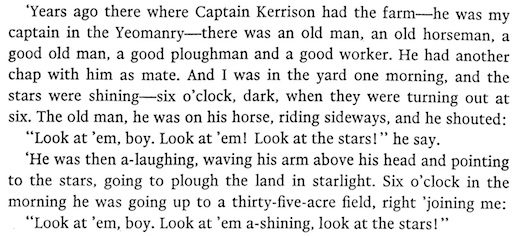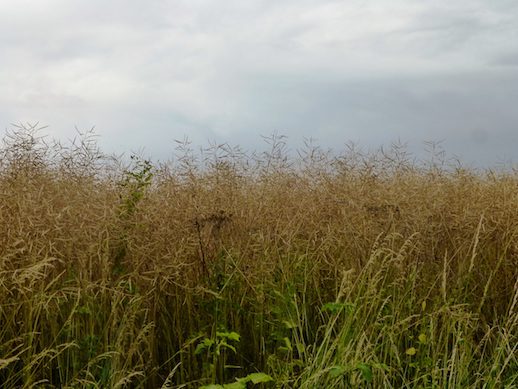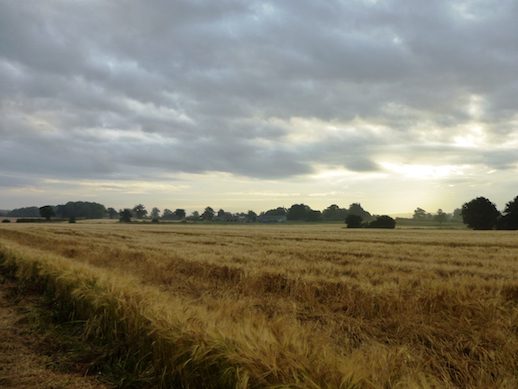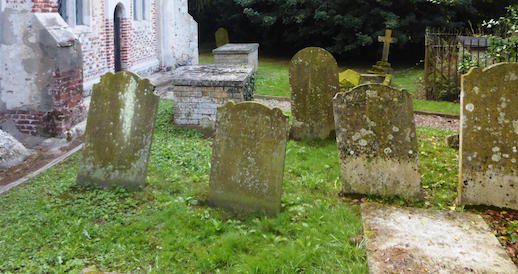Memory Band founder-member Stephen Cracknell visits the landscape which provided the inspiration for their latest LP, A Fair Field:
It took me a while to get out of Norwich. Needing a map, I had to climb the hill to a bookshop from the train station, slipping through the early lunchtime crowds. Then, confused by road signs, I made the mistake of asking directions from a couple of locals. But soon enough I crossed the river and headed through Trowse, once a model village built by the makers of Colman’s mustard. I pedalled past the site of Arminghall Henge, then over the A47, which cut a vast wedge through the hillside, and stopped briefly at the Venta Icenorum, the Roman marketplace of the Iceni tribe. The road I cycled upon ran parallel to the River Tas, but I could not see it. Then at the parish church south of Stoke Holy Cross I turned south east and approached the landscape which had brought me here.
My first destination was the area around the village of Brooke, where in 1977, the writer George Ewart Evans interviewed his neighbour Albert Hupton, then 88 years old. Albert had farmed the surrounding lands all his life: on smallholdings owned by his family or ploughing for other landowners in the neighbourhood. A recording of this interview is archived on the British Library Sound website. At the end of the interview Albert recalled a tale which later appeared in George Ewart Evans’ book Horsepower And Magic:
An extract of that recording forms the introduction to ‘Starlight’ on the new album by The Memory Band, and that is what brings me here on a bicycle in late July, thirty nine years after the recording was made.
I cycled around, passing many of the places Albert names in the interview. Old House Farm. High Green, Brooke Wood. Kirstead, Bethel Farm, Seething “a blue clay, the heaviest land ever I knew” . At Brooke I paused at the house where Ewart Evans lived, just opposite the duckponds. Two years later Albert was interviewed again by George, this time about his memories of hares for the book The Leaping Hare. Just past Brooke I saw two hares darting across a ridge in a field facing back towards Kirstead, and I couldn’t help but wonder which one was Albert and which George.
As I rode on towards Seething the skies darkened and it began to rain very lightly. The landscape I was passing through had a very subtle strangeness to my eyes. It is not the flattest part of East Anglia. The hills roll but they never climb that high. Looking across the horizon there were no dark hills in the distance, all features near, little sense of the beyond.
The rain began to worsen. After stopping in Lodden I took the road south west to where I would be staying the night, hoping to avoid a drenching, but as I cycled on the heavens opened and I took shelter under a tree for quite some time. Finally I pushed on regardless and gradually descended a long slope into the woodlands below. Although wet, the ride was exhilarating. Everything seemed alive in the rain, moving to its swirling rhythm. I realised I’d lost my course and probably missed a turning, but I kept on riding, happy to be moving, knowing my resting place was near. I reached the main road, took a short loop back up a hill towards the line of trees and finally reached the campsite. Very soon I was taking shelter again from the rain and settled in for the night.
I woke before dawn and in the last gasp of twilight an owl swooped over my head into the field that I was sat in, across the long grass and then it was gone again into the half-light. A quartet of geese flew northwards overhead as the first glimpses of light appeared faintly across the morning sky. I made a short recording of the field I had stayed in and then I was off.
Thanks to the research of a distant cousin whom I have never met, I had learned that the countryside I was moving through was once inhabited by a number of my maternal ancestors — up until the second half of the 19th century, when like so many others, they left. A couple of miles away from where I stayed stood a rarity for my predecessors, which I wanted to see.
As the dawn broke I made my way towards the churchyard of Stockton, cycling along the Old Bungay Road. I surprised pheasants, buzzards and a whole host of other birds who clearly expected the road to themselves. The unbroken morning was glorious, everything shrouded in the lightest mist as light slowly spread across it. I took a bumpy track alongside fields which took me to the old farmhouse and church at Stockton, and sat under a canopy of trees with a tumbledown graveyard wall. I walked around the churchyard, scanning the headstones in search of the Larke family, the name of my ancestors. Having walked all the way round I finally found two gravestones nestled near the southern wall of the church…
One bore the names of Robert Larke and his wife Mary, and right next to it was the headstone for their son, also named Robert. There was an inscription on the younger Robert’s stone — unclear at first, but after some rubbing and by using my finger to trace the mason’s marks, the words finally made themselves known.
In memory of Robert Larke, the Son of Robert and Mary Larke, who unfortunately lost his Life by the Mill sails on the 7th of Sept. 1830, Aged 56 years. ‘Boast not thyself of tomorrow for thou knowest not what a day may bring forth’
Proverbs C XXVII, V 1
After a time I cycled East, away from the churchyard and past the trees. But very quickly I stopped, just a few hundred yards short of the A road, which now separated the church from the rest of the old parish of Stockton. Ahead of me was a hare. First running, it too had now stopped, probably conscious of me. I stood still, watched and waited. This time I knew it was Albert. Then finally he twitched and was gone. Slowly, very slowly, I followed in his wake.
*
A Fair Field is out now on Static Caravan. Buy a copy here.
Stephen Cracknell / The Memory Band on Caught by the River / on Twitter



